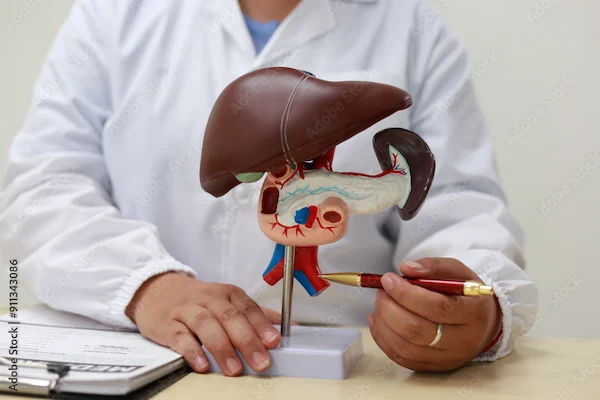The ABCs of Hepatitis: Types, Causes, Symptoms, and Prevention
Learn about the causes, symptoms, diagnosis, treatment, and prevention of hepatitis A, B, C, D, and E. Stay informed about risk factors and vaccination options.

Written by Dr.Sonia Bhatt
Last updated on 3rd Jul, 2025

The term "hepatitis" originates from the Greek word "hepar," meaning liver, and the suffix "-itis," which refers to inflammation. Hepatitis is a medical condition marked by liver inflammation, primarily caused by viral infections. Other contributing factors include autoimmune disorders, certain medications, drug use, toxins, and excessive alcohol consumption. Autoimmune hepatitis occurs when the immune system mistakenly attacks the liver with antibodies.
There are five main types of viral hepatitis: A, B, C, D, and E, each caused by a specific virus. According to the World Health Organization (WHO), millions of people worldwide are living with chronic hepatitis B and C, which are significant causes of liver-related illnesses.
Transmission of Hepatitis
Hepatitis can arise from a range of causes, including infections, toxins, and autoimmune conditions. Recognising the specific type of hepatitis and how it is transmitted is vital for prevention, early diagnosis, and effective treatment. The transmission routes for each type are as follows:
1.Hepatitis A:
Faecal-oral route, or eating food or drinking water contaminated with the hepatitis A virus (HAV).
2.Hepatitis B:
Contact with bodily fluids containing the hepatitis B virus (HBV), such as blood, semen, or vaginal fluids.
Can be transmitted through unprotected sexual contact, sharing needles, or from mother to baby during childbirth.
3.Hepatitis C:
Exposure to bodily fluids infected with the hepatitis C virus (HCV), including blood, semen, or vaginal fluids.
Less commonly, it can be transmitted through sexual contact or from mother to baby during childbirth.
4.Hepatitis D:
Contact with blood infected with the hepatitis D virus (HDV).
Occurs only in individuals already infected with hepatitis B, as it requires the hepatitis B virus to replicate.
5.Hepatitis E:
Faecal-oral route, or consuming food or water contaminated with the hepatitis E virus (HEV).
Understanding these transmission methods is key to preventing the spread of hepatitis and maintaining good public health.
Symptoms and Early Signs of Hepatitis
The most common symptoms of hepatitis are:
Dark urine
Abdominal pain
Jaundice (yellowing of the skin or eyes)
Pale or clay-coloured stools
Mild fever
Loss of appetite
Fatigue
Nausea
Joint pain
These symptoms can differ in severity and may vary depending on the type and stage of hepatitis. The specific symptoms for each type of hepatitis are:
Hepatitis A: Symptoms typically appear suddenly and usually resolve within a few weeks.
Hepatitis B: Chronic infection can result in long-term liver damage, cirrhosis, and an increased risk of liver cancer.
Hepatitis C: Often leads to a chronic condition, leading to cirrhosis and liver failure, sometimes with few or no symptoms in the early stages.
Hepatitis D: Occurs only in individuals already infected with hepatitis B, as it relies on the hepatitis B virus to replicate.
Hepatitis E: Can cause more severe symptoms in pregnant women, potentially leading to liver failure in the long run.
Risk Factors for Contracting Hepatitis
Understanding the risk factors for hepatitis is crucial in preventing its spread and protecting overall health. The following are key risk factors that can increase the likelihood of contracting hepatitis:
Infected Blood: Transmission can occur through the sharing of needles, unsafe medical practices, or blood transfusions involving contaminated blood.
Unprotected Sex: Hepatitis B and C can spread via unprotected sexual contact, highlighting the importance of using condoms.
Mother to Child: Hepatitis can be transmitted from mother to baby during childbirth, although the risk can be reduced with vaccination and proper medical care.
Contaminated Food or Water: Hepatitis A and E are spread through the consumption of contaminated food or water, making hygiene and safe food handling essential for prevention.
Intravenous Drug Use: Sharing needles or drug paraphernalia raises the risk of contracting hepatitis B and C.
Unsafe Body Modifications: Non-sterilised equipment used for tattoos or piercings can transmit hepatitis.
Sharing Personal Items: Personal items such as razors or toothbrushes can spread hepatitis if shared with someone infected.
Metabolic Conditions: Health issues like high cholesterol, diabetes, and obesity can increase the likelihood of developing hepatitis.
Living in or Travelling to Areas with Poor Sanitation: Inadequate sanitation in certain regions can elevate the risk of exposure to hepatitis A and E.
Exposure to Toxic Chemicals: Certain work environments where toxic chemicals are present can increase the risk of hepatitis.
Diagnosis of Hepatitis
Healthcare professionals use a variety of tests to determine the cause of hepatitis. The diagnostic process typically involves:
History and Physical Examination: The doctor will review your medical history to identify any risk factors. During the physical exam, they may check for tenderness in the abdomen, liver enlargement, or jaundice (yellowing of the skin or eyes).
Liver Function Tests: Blood tests are used to evaluate liver function. Elevated liver enzyme levels can indicate liver problems, even in the absence of noticeable symptoms.
Other Blood Tests: If liver function tests show abnormal results, further blood tests may be performed to identify the hepatitis virus, antibodies, or markers for autoimmune hepatitis.
Liver Biopsy: A liver biopsy may be recommended to assess liver damage. This involves taking a small tissue sample from the liver using a needle, often guided by ultrasound.
Ultrasound: An abdominal ultrasound provides images of the liver and nearby organs, helping to identify fluid build-up, liver damage, enlargement, tumours, or issues with the gallbladder.
These tests allow healthcare professionals to understand the cause of hepatitis and determine the appropriate treatment plan.
Treatment Options for Hepatitis
Hepatitis treatment varies depending on the type and whether it is acute or chronic. Here is an overview of treatment strategies for different forms of hepatitis:
Hepatitis A: No specific treatment is available; prevention is possible with the hepatitis A vaccine or immunoglobulin.
Chronic Hepatitis B: Treated with medications like Entecavir, Tenofovir, and Interferon.
Hepatitis C: Treated with antivirals such as Sofosbuvir, Simeprevir, and Harvoni.
Chronic Hepatitis D: Treated with interferon and hepatitis B medications.
Hepatitis E: Treated with peginterferon alfa-2a and ribavirin.
Acute Hepatitis: Treatment focuses on hydration, nutrition, and symptom relief. Hospitalisation may be needed for high-risk individuals.
Chronic Hepatitis: Treatment aims to preserve liver function and boost the immune system with medications and complementary therapies.
Lifestyle Recommendations: A diet rich in protein, vegetables, and whole grains, with limited fats, salt, and sugar, supports recovery. Small, frequent meals are recommended, and hydration is important. Regular exercise, around 30 minutes a day, helps improve strength and reduce fatigue. Always consult a doctor before starting an exercise programme.
Prevention Strategies Against Hepatitis
Hepatitis is a viral infection that can spread through various means, and taking the right precautions is crucial in reducing the risk of transmission. To reduce the risk of hepatitis transmission and to protect yourself and others from contracting the virus follow these precautions:
Wash clothes in hot water and disinfect surfaces.
Use condoms, avoid sharing personal items, and handle blood-contaminated objects with care.
Wash hands thoroughly after using the toilet, preparing food, or coming into contact with bodily fluids.
People with hepatitis should not prepare food for others.
Ensure that at-risk individuals receive the appropriate hepatitis vaccination.
Avoid sharing needles, razors, and toothbrushes, and use sterile equipment in tattoo and piercing parlours.
Limit sexual partners and practise safe sex.
Healthcare workers should adhere to universal safety precautions.
Immunisation plays a crucial role in preventing the spread of hepatitis.
Hepatitis A: Recommended for those at higher risk, including travellers, healthcare workers, and men who have sex with men.
Hepatitis B: Vaccination is advised for high-risk groups such as healthcare workers and individuals with multiple sexual partners.
Hepatitis C: No vaccine exists, but immunoglobulin can offer protection following blood transfusions.
Conclusion
In conclusion, while some types of hepatitis may be short-lived and self-resolving, others can develop into acute or chronic conditions with more serious long-term health implications. Early detection, vaccination, and preventative measures are key to managing and reducing the risk of hepatitis. Misinformation surrounding the condition can contribute to stigma, deterring individuals from seeking diagnosis and treatment. Public health campaigns should focus on raising awareness, promoting vaccination, and encouraging regular health checks. Anyone who suspects they have hepatitis should seek medical advice without delay.
Consult Top Hepatologists
Consult Top Hepatologists

Dr. Srinivasa Reddy
Hepatologist
12 Years • MBBS, MD (General Medicine), DM (Hepatology),ASGE
Hyderabad
Myra Liver & Gastro Care, Hyderabad

Dr. E Prabhakar Sastry
General Physician/ Internal Medicine Specialist
40 Years • MD(Internal Medicine)
Manikonda Jagir
Apollo Clinic, Manikonda, Manikonda Jagir
(125+ Patients)

Dr. Sushith C
General Physician
2 Years • MBBS
Bengaluru
PRESTIGE SHANTHINIKETAN - SOCIETY CLINIC, Bengaluru

Dr. Akshatha Manjunath
General Surgeon
8 Years • MBBS, MS
Bangalore
Apollo Clinic Bellandur, Bangalore

.webp)


